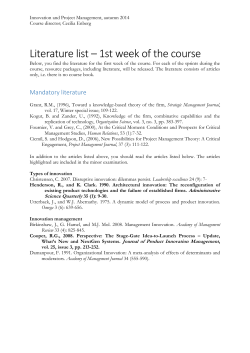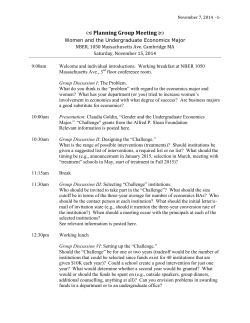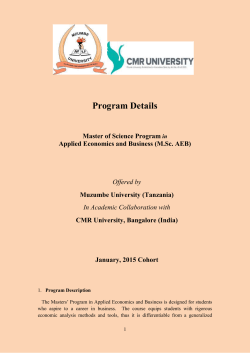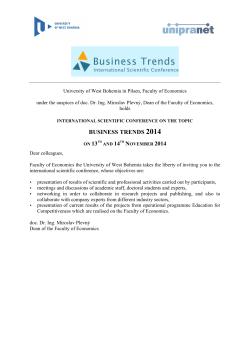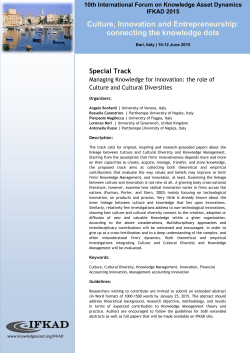
Institutional change in the Context of Social Values
Institutional change in the Context of Social Values and Interest Groups V.V. VOLCHIK, Doctor of Economics (DSc), Professor, Southern Federal University, Rostov-on-Don, Russian Federation e-mail: volchik@sfedu.ru Abstract: This paper is an attempt to analyze institutional change in the economy synthesizing the original and new methodologies of institutional economics. The concepts of social values, interest groups, and social capital are applied in this context in order to create a theoretical framework based on a qualitative study of evolutionary dynamics of various economic orders. Researching social values and actions of interest groups, the author underscores manifold behavioral dimensions associated with the given behavioral pattern formation and habits. The long-run evolutionary vector of development of institutions and economic systems is determined by the values supported by the prevailing economic order – either ceremonial or instrumental. Analyzing the phenomenon of ceremonial dominance facilitates devising the measures of economic and social policy aimed to enhance the quality of human and social capital. Keywords: institutional economics; institutional change; social capital; social values; interest groups JEL classification: B52, A13, Z18 Introduction Institutional change constitute one of the fundamental problems of the modern institutional economic theory. Under the frame of today’s academic discourse, however, the problem of institutional change is analyzed predominantly in light of the theories of new institutional economics. Note that in the mainstream economic theory the issue of institutional change for a long time was outside the domain, or, at least at the research periphery. Global economic processes in the 1980-1990s compelled scholars to think of the importance of institutions for economic development, especially in the countries in transition from the centrally planned system to the market economy. 2 An approach to institutional change in line with the traditions of new institutional economics makes an emphasis on institutions as an exogenous factor influencing behavior of economic actors (Greif, 2006). The modern institutional theory, however, offers two approaches to understanding the nature of institutions. Some scholars think that institutions are endogenous and comprise believes (about behavior of other actors) that are included in individual mental models. In contrast, another group of scholars define institutions as exogenous, linking rules that constrain individual actions. Under this approach, creating rules is a purely strategic process, the focus must be on the tactics applied by various agents or their alliances to manipulate them or, at least, affect the “rules of the game” (Brousseaua, Garrousteb, Raynaudc, 2011, p. 4). Thus, the first approach emphasizing endogenous nature of institutions is typical for the original (old) institutionalism, while the exogenous approach – for neo-institutionalism. In the context of the paper, using the concepts of social values, groups of interest, social capital and path dependency for studying institutional change is based on the methodological synthesis of the new and the original (old) institutional economics as well as economic sociology. This approach is employed as part of deliberative discourse (Volchik, 2013) in economic – and broader – social sciences, enabling to more forward to a more rounded understanding of the complex and equivocal phenomenon of institutional change. Institutions and Social Values Shaping an institutional system (structure) of the society depends on the dominant social values. The latter are related directly to behavioral patterns. Traditionally, social values are divided into two groups: ceremonial and instrumental. It should be noted that real societies have complex combinations of mixed values, when in some 3 cases instrumental values become dominant, and in other cases – ceremonial values tend to prevail. Most frequently social systems have an institutional system (structure) that without due regulation and government policy inevitably evolves to the dominance of traditional values. Such instrumental structure cannot support the processes of social modernization and reproduction of instrumental values. Therefore, social-andeconomic policy must not inculcate myths and ceremonial values (Bush, 1987). Traditional institutionalism interprets the key importance of institutions for the society as determining behavioral patterns. A broadly used behavioral classification comprises three elements: ceremonial behavior; instrumental behavior; and mixed behavior (Bush, 1987; Elsner, 2012). Behavioral patterns are closely connected to a system of social values, where ceremonial and instrumental values are of the key importance. Ceremonial values give preference to possessing power and high social status, while the opposite, instrumental values favor economic and technological efficiency. Ceremonial values form the basis of various privileges, determine social status, power relations in the context of social classes and strata, relations between superiors and subordinates, and are based on the myths and traditions rooted in a particular society (Bush, 1987, p. 1079). Instrumental values, on the other hand, are a fundamental factor underlying modernization and development of an institutional system. They are designed to solve the current problems of a society closely related to the mastery instinct, and are created and adopted by the population through a well-thought social policy, by expanding knowledge and education. 4 Traditional values (evolutionary formed combinations of instrumental and ceremonial values) are related to the quality of social relations and, subsequently, social capital. If education is not developed within a society, ceremonial values will dominate. The level of education is inversely related to archaic values, social capital and institutions. In theory, institutional change in the structure of values are captured in the institutional context of ceremonial dominance that reflects a wider dissemination of ceremonial values in comparison with the instrumental ones. In practice it means that domineering and imposing traditional (ceremonial) values prevents efficient institutional change. P. Bush points out that the institutional structure of a society often is unable to maintain vital social processes and support instrumental knowledge; that is why social-and-economic policy must not inculcate myths and ceremonial values (Bush, 1987, p. 1091). Traditional institutionalism emphasizes the importance of studying institutional change through the lens of their discretion nature; which does not mean, however, that all changes are deliberate and intentional. Studying institutional change, demographic policy, development of demographic institutions, self-regulation, trust and confidence, freedom of speech, self-expression and associations should be of considerable importance. Social capital not only conditions possibility and efficiency of social-and-economic interactions; it also is one of the most significant factors that determine an innovative nature of operations exercised by economic entities. The main elements of social capital in this context are confidence and corporate norms (routines) (Zheng, 2010). 5 Analysis of social capital is a different level of research in comparison with studies of the individuums – institutions dichotomy. Social capital studies focus on the networks of individual relations and interactions, where trust and emotionallycolored behavior patterns of partners are especially important. Certain forms of social capital, for example, long-term social interactions, are based on trust and, for instance, religious norms, and can regulate creating and distributing public goods in local communities (Fafchamps, 2006). A Synthesis of the Theories of Institutional Change D. North outlined the conceptual framework of institutional change in new institutional economic theory. However, institutional change are also an important problem in the old (or original) institutionalism. Due to the specifics of academic communications in economic theory, theoretical constructs of old institutionalism have been replaced with new institutional theory. In spite of it, the old institutional school has relevant theories that one can successfully apply to researching institutional dynamics. Analysis of institutional change presumes that history matters. New economic history (cliometrics) became an important component of neo-institutionalism, while the works of such scholars as North (1981), Fogel (1989), Mokyr (1990), Greif (2006), and Nye (2007) built up a powerful research program. Although it is possible to point out that for instance, North’s ideas evolved considerably towards an inter-disciplinarian synthesis, which is some aspects brings his later works closer to the concepts of traditional institutionalism (North, 2010; North, Wallis and Weingast, 2011). 6 The fact that market metaphors1 are not always applicable to analysis of changes and selection of institutions is important for analysis of institutional change (Maucourant, 2012). Under the North’s tradition of analyzing institutional change, evolution of economic orders can be considered as a transition from the natural state (limited access) to the open-access order in developed democratic countries with the market economy (North, Wallis and Weingast, 2011). The range of these problems can relate to Veblen-Ayres dichotomy (Volchik, 2008). Inertial institutions are associated with rooted values and social capital. Changing as well as accumulating them is linked to socialization, education and technologies used in production. On the other hand, regulatory mechanisms can change rather radically during reforms. For harmonious evolution of a social order it must include the necessary procedures that transform regulatory mechanisms, for instance, in the course of law enforcement, into some universal rules, on which the institutions of the open-access order are based. Commons showed how institutional foundations of capitalism are formed in the legal system where the common law dominates (Commons, 2011). Analysis of special interests groups plays a considerable role in the neo-institutional modification of the theory of institutional change. In this context institutions are analyzed in relations with the problems of cooperation and opportunistic behavior in small and large groups, for example, the free-rider effect and actions of special interests groups as institutional innovators (Olson, 1995b). Actions of narrow special interests groups result in income redistribution and ultimately delay economic development. A negative effect of narrow special interests groups is not limited by influence upon economic development indices. 1 For instance, institutional analysis uses widely such metaphors as “market of institutions”, “political markets”, etc. 7 Special interests groups restrict access to establishing organizations and also form an institutional structure preventing the existing ones functioning. Groups of interests can also be analyzed using the social capital theory. Indeed, social capital concepts emphasize the two key elements: trust and establishing social links by creating voluntary associations. Groups of interests (both formal and informal) can exist as voluntary associations, which along with trust indices determine the quality of social capital in a particular economic order. In the academic literature social capital is associated with three most important components: trust, behavioral norms that encourage cooperation, and social networks (Polischuk and Menyashev, 2011). Social networks formed in a society can result in a considerable, increasing return that determine a particular quality of social capital. If the norms that were the reasons for establishing social networks were inefficient or suboptimal for economic development, they can be formalized for a considerable period of time due to the lock-in effect and path dependence (Arthur, 1989). In the market economy, which corresponds with the order of open access, it is the quality of social capital that forms the basis for establishing and functioning of the institutions that support impersonal generalized exchange. Seligman points out the importance of analyzing social capital taking into account generalized trust within groups. Such trust transforms an association of social actors into a moral community since trust is a type of social capital gained and used only by a group as a whole, which enables developing generalized trust across its members (unlike individual capital gained by individuals and used by them to achieve private goals such as education, practice al training, etc.) (Seligman, 2002). 8 Group of interests have incentives to formalize the existing social capital in created public institutions and statuses. For example, such institutions as casts, estates, nomenclatura, or localism are manifestations of institutionalization of social capital (trust, associations) of a particular group. Such groups are interested in reproducing the existing social groups as the select few under a particular category: kin, national, religious, etc. As a result of cultural evolution and functioning of a legal system, open-access societies established institutions that do not allow (prevent) social capital to be institutionalized in the form of rigid hierarchical social structures. On the contrary, the dominant interest groups in restricted-access orders by all means are interested in reproducing the restrictions bases on statuses, social roles or, for instance, belonging to the elite. Elite organizations restrict possibilities to create competitive structures – political parties and corporations in the present-day context. They can set such restrictions in written law, for example, by introducing a one-party system or state property for all big economic enterprises. Pretty often, however, such restrictions tend to be less formal: regulatory obstacles for market entry or expansion of new companies, arrests and physical pressure upon resisting individuals and organizations or depriving the latter of the access to media and financial resources (North, Wallis, Webb. and Weingast, 2012, p. 9). Establishing strong interest groups is related to political and economic sustainability. The sustainability factor can have a double impact upon economic development. On the one hand, sustainability enables the main economic actors to make more longterm investments. On the other, sustainability is related to the dominant position of 9 special interest groups inclined towards rent-seeking behavior and redistributing resources to their benefit, characterized by Olson as social sclerosis (Olson, 1995a). Special interest groups can have positive as well as adverse impact upon economic development (Hoenack, 1989). Positive impact can be related primarily to united actions of entrepreneurs aimed at decreasing administrative barriers and improving business infrastructure. A positive effect of interest groups can also be associated with their efforts to introduce technological innovations, for instance, by attracting big corporations involved in science-intensive production with considerable increasing return to a particular region. Establishing interest groups that have positive impact upon economic development, however, is related to the dominant social values in a particular region. Conclusions Traditional institutionalism contributed to analysis of institutional change, first of all, by studying predominantly qualitative factors that determine economic behavior of actors, the central of which are social values dominating an economic order. Analysis of social values and behavioral patterns enables integrating the theory of institutional change with studies of social capital and group actions, broadly used in modern social sciences. REFERENCES Arthur W.B. (1989). Competing Technologies, Increasing Returns, and LockIn by Historical Events. The Economic Journal, v. 99, No. 394. Brousseau E., Garrouste P., Raynaud E. (2011). Institutional changes: Alternative theories and consequences for institutional design // Journal of Economic Behavior & Organization, vol. 79, issue 1–2, pp. 3–19. Bush P.D. (1987). The Theory of Institutional Change. Journal of Economic Issues, vol. XXI, No. 3, pp. 1075–1116. Commons J.R. (2011). Legal foundations of capitalism. Moscow: State University Higher School of Economics Publishing. (In Russian.) 10 Elsner W. (2012). The Theory of Institutional Change Revisited: The Institutional Dichotomy, Its Dynamic, and Its Policy Implications in a More Formal Analysis. Journal of Economic Issues, vol. XLVI, No. 1. Fafchamps M. (2006). Development and Social Capital. Journal of Development Studies, vol. 42, No. 7, pp. 1180–1198. Fogel R. (1989). Without Consent or Contract. New York: Norton. Greif A. (2006). Institutions and the Path to the Modern Economy: Lessons from Medieval Trade. Cambridge. Hoenack St.A. (1989). Group Behavior and Economic Growth. Social Science Quarterly, vol. 70, No. 3, pp. 744–758. Maucourant J. (2012). New Institutional Economics and History. Journal of Economic Issues, vol. XLVI, No. 1. Mokyr J. (1990). The lever of riches: Technological creativity and economic progress. Oxford: Oxford University Press. North D. (2010). Understanding the Process of Economic Change. Moscow: State University Higher School of Economics Publishing. (In Russian.) North D., Wallis J. and Weingast B. (2011). Violence and Social Orders: A Conceptual Framework for Interpreting Recorded Human History. Moscow: Gaidar Institute Publishing House. (In Russian.) North D., Wallis J. Webb S. and Weingast B. (2012). In the Shadow of Violence: Lessons for Limited Access Societies. Voprosy Ekonomiki, No. 3. (In Russian.) North D.C. (1981). Structure and change in economic history. New York: W.W. Norton. Nye J. (2007). War, Wine, and Taxes: The Political Economy of AngloFrench Trade, 1689–1900. Princeton, NJ. Olson M. (1995a). Devolution of power and society in a transitional period. Remedies to corruption, economic decline and deceleration of economic growth. Economics and Mathematical Methods (Ekonomika i matematicheskie metody), vol. 31, issue. 4. (In Russian.) Olson M.Jr. (1995b). The Devolution of the Nordic and Teutonic Economies. American Economic Review, v. 85, No. 2, pp. 22–27. Polischuk L. and Menyashev R. (2011). Economic value of social capital. Voprosy Ekonomiki, No. 12. (In Russian.) Seligman А. (2002). The Problem of Trust. Moscow: Idea-Press. (In Russian.) Volchik V.V. (2008). Postindustrial economy institutions evolution in context of Veblen’s dichotomy. Economic Herald of Rostov State University, vol. 6, No. 2. (In Russian.) Volchik V.V. (2013). The principles of deliberative democracy to solve problems in economic theory. Journal of Institutional Studies, vol. 5, No. 2. (In Russian.) 11 Zheng W. (2010). A Social Capital Perspective of Innovation from Individuals to Nations: Where is Empirical Literature Directing Us? International Journal of Management Reviews, vol. 12, No. 2, pp. 151–183
© Copyright 2025
